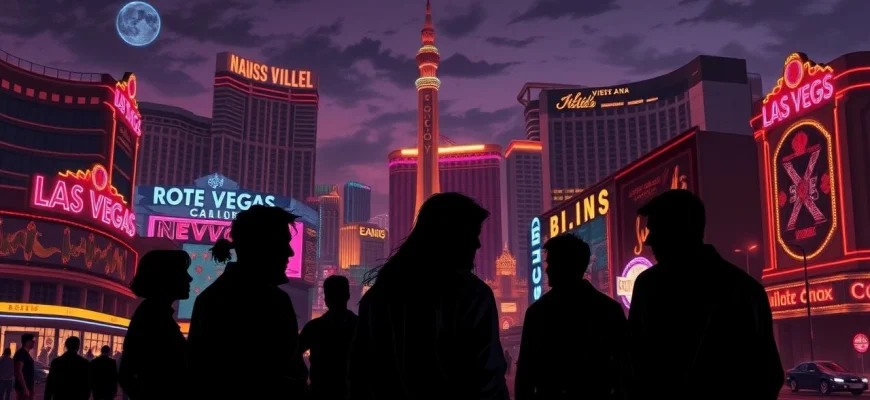If you loved the high-stakes drama, intense performances, and gripping storytelling of Martin Scorsese's 'Casino' (1995), you're in for a treat. This article explores 10 movies and TV shows that capture the same electrifying energy, complex characters, and dark allure of the Las Vegas underworld. Whether you're a fan of crime sagas, character-driven narratives, or cinematic masterpieces, these recommendations will keep you on the edge of your seat.
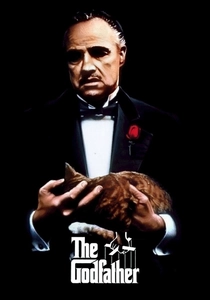
The Godfather (1972)
Description: Similar to 'Casino' (1995), 'The Godfather' delves deep into the world of organized crime, showcasing the intricate dynamics of power, loyalty, and betrayal within the mafia. Both films are directed by Martin Scorsese and Francis Ford Coppola, respectively, who are known for their masterful storytelling and attention to detail in depicting the criminal underworld. The themes of family, both biological and criminal, are central to both movies, as is the inevitable downfall of the protagonists due to their own hubris and the volatile nature of their lifestyles.
Fact: 'The Godfather' was initially met with resistance from studio executives who wanted a different cast, including rejecting Al Pacino for being too short. Marlon Brando won the Oscar for Best Actor but famously refused it, sending a Native American activist in his place to protest Hollywood's portrayal of Native Americans. The cat held by Brando in the opening scene was a stray that wandered onto the set and was not originally scripted.
 Watch Now
Watch Now 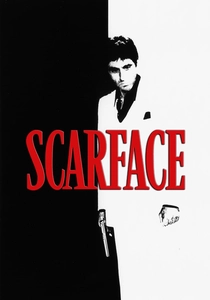
Scarface (1983)
Description: Like 'Casino', 'Scarface' is a rise-and-fall story of a criminal who achieves immense power and wealth, only to be undone by his own excesses and paranoia. Both films are unflinching in their portrayal of violence and the dark side of the American Dream. The protagonists, Tony Montana and Sam 'Ace' Rothstein, are charismatic yet deeply flawed individuals whose ambitions lead to their downfall. The films also share a similar visual style, with lavish set designs and a focus on the opulence of their characters' lifestyles.
Fact: Al Pacino's performance as Tony Montana is one of the most iconic in film history, despite initial mixed reviews. The film was criticized upon release for its excessive violence and profanity but has since become a cult classic. The famous 'Say hello to my little friend!' line was improvised by Pacino.
 Watch Now
Watch Now 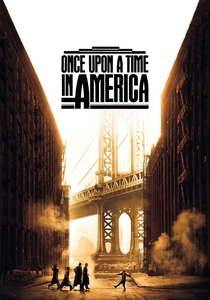
Once Upon a Time in America (1984)
Description: 'Once Upon a Time in America' and 'Casino' both chronicle the rise and fall of criminal figures over decades, with a strong emphasis on the passage of time and the consequences of their actions. Both films are epic in scope, featuring nonlinear storytelling and rich character development. The themes of friendship, betrayal, and the fleeting nature of power are central to both movies, as is the lush, period-specific production design.
Fact: The film was originally over 4 hours long but was drastically cut for its U.S. release. Sergio Leone considered the film his masterpiece and his final directorial work. The score by Ennio Morricone is considered one of the greatest in film history.
 Watch Now
Watch Now 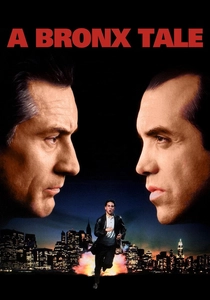
A Bronx Tale (1993)
Description: 'A Bronx Tale' shares with 'Casino' a focus on the allure and dangers of the criminal lifestyle, as seen through the eyes of a young protagonist. Both films are set in distinct, vibrant communities (the Bronx and Las Vegas) and explore themes of loyalty, family, and the moral ambiguities of life on the fringes of society. The directorial styles of Robert De Niro and Martin Scorsese both emphasize character-driven storytelling and a deep sense of place.
Fact: The film is based on Chazz Palminteri's one-man play, which he also adapted for the screenplay. Robert De Niro made his directorial debut with this film. The character of Sonny was inspired by a real-life mobster Palminteri knew in his youth.
 Watch Now
Watch Now 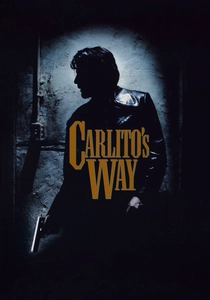
Carlito's Way (1993)
Description: 'Carlito's Way' and 'Casino' both follow reformed criminals who attempt to leave their pasts behind, only to be pulled back into the world of crime. Both films are directed by Brian De Palma and Martin Scorsese, respectively, and feature Al Pacino in a starring role. The themes of redemption, inevitability, and the inescapable nature of one's past are prominent in both movies, as is the stylish, kinetic direction that heightens the tension and drama.
Fact: The film is based on two novels by Edwin Torres, who was a real-life New York Supreme Court judge. The famous nightclub scene was shot in a real, now-defunct New York club called The Copacabana. Al Pacino's character, Carlito Brigante, was inspired by a real-life Puerto Rican criminal.
 Watch Now
Watch Now 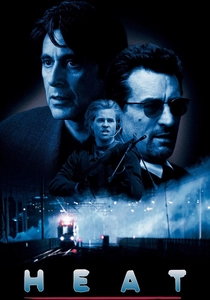
Heat (1995)
Description: 'Heat' and 'Casino' both delve into the lives of professional criminals and the law enforcement officers who pursue them, set against the backdrop of a major American city (Los Angeles and Las Vegas, respectively). Both films feature Robert De Niro in a leading role and are known for their intense, realistic portrayals of crime and its consequences. The themes of obsession, professionalism, and the personal costs of a life of crime are central to both movies.
Fact: The famous diner scene between Al Pacino and Robert De Niro was the first time the two actors shared screen time. The bank heist shootout was filmed on location in downtown LA and used real blanks, creating a chaotic, realistic effect. The film was inspired by a real-life criminal, Neil McCauley, whom the director, Michael Mann, had interviewed years earlier.
 Watch Now
Watch Now 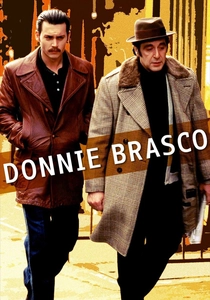
Donnie Brasco (1997)
Description: 'Donnie Brasco' parallels 'Casino' in its exploration of the criminal underworld, particularly through the lens of an undercover agent (Johnny Depp) who becomes too deeply enmeshed in the life he's supposed to be investigating. Both films highlight the psychological toll of living a double life and the blurred lines between loyalty and betrayal. The performances by Al Pacino and Robert De Niro in their respective films are standout elements, adding depth to their complex characters.
Fact: The film is based on the true story of FBI agent Joseph D. Pistone, who infiltrated the Bonanno crime family. Al Pacino's character, Lefty Ruggiero, was a real-life mobster who was allegedly killed as a result of Pistone's infiltration. Johnny Depp spent time with the real Donnie Brasco to prepare for the role.
 Watch Now
Watch Now 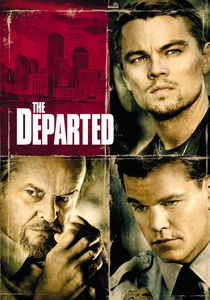
The Departed (2006)
Description: 'The Departed' shares with 'Casino' a focus on the gritty, violent, and morally ambiguous world of crime, this time within the context of the Boston underworld and law enforcement. Both films are directed by Martin Scorsese and feature complex characters who navigate treacherous environments where trust is a liability. The themes of identity, deception, and the psychological toll of living a double life are prominent in both movies, culminating in intense, bloody climaxes that underscore the destructive nature of their worlds.
Fact: 'The Departed' is a remake of the Hong Kong film 'Infernal Affairs' (2002). Jack Nicholson improvised many of his lines, including the infamous 'I'm the guy who does his job. You must be the other guy.' The film marked Scorsese's first Oscar win for Best Director after several nominations.
 Watch Now
Watch Now 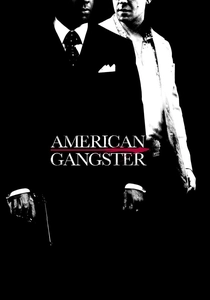
American Gangster (2007)
Description: 'American Gangster' shares with 'Casino' a focus on the rise and fall of a criminal empire, this time centered around the drug trade in Harlem. Both films are based on true stories and explore the themes of ambition, power, and the inevitable downfall due to law enforcement and internal betrayals. The meticulous attention to period detail and the complex character studies are strengths of both movies, offering a gritty, realistic portrayal of their respective eras.
Fact: Denzel Washington and Russell Crowe did not meet during filming to maintain their characters' adversarial tension. The real Frank Lucas served as a consultant on the film. The film was originally intended to be directed by Antoine Fuqua, with Denzel Washington and Benicio del Toro starring.
 Watch Now
Watch Now 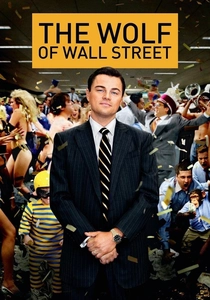
The Wolf of Wall Street (2013)
Description: 'The Wolf of Wall Street' mirrors 'Casino' in its depiction of excess, greed, and the moral decay of its protagonist. Both films are directed by Martin Scorsese and feature charismatic leads (Leonardo DiCaprio and Robert De Niro) who revel in their unethical behavior, only to face the consequences of their actions. The fast-paced, energetic storytelling and dark humor are hallmarks of both movies, as is the critique of the corrupting influence of wealth and power.
Fact: The film is based on the real-life memoir of Jordan Belfort, who makes a cameo in the movie. It holds the record for the most uses of the word 'fuck' in a non-documentary film (569 times). Leonardo DiCaprio injured himself during the quaaludes scene, but it was kept in the final cut.
 Watch Now
Watch Now 
